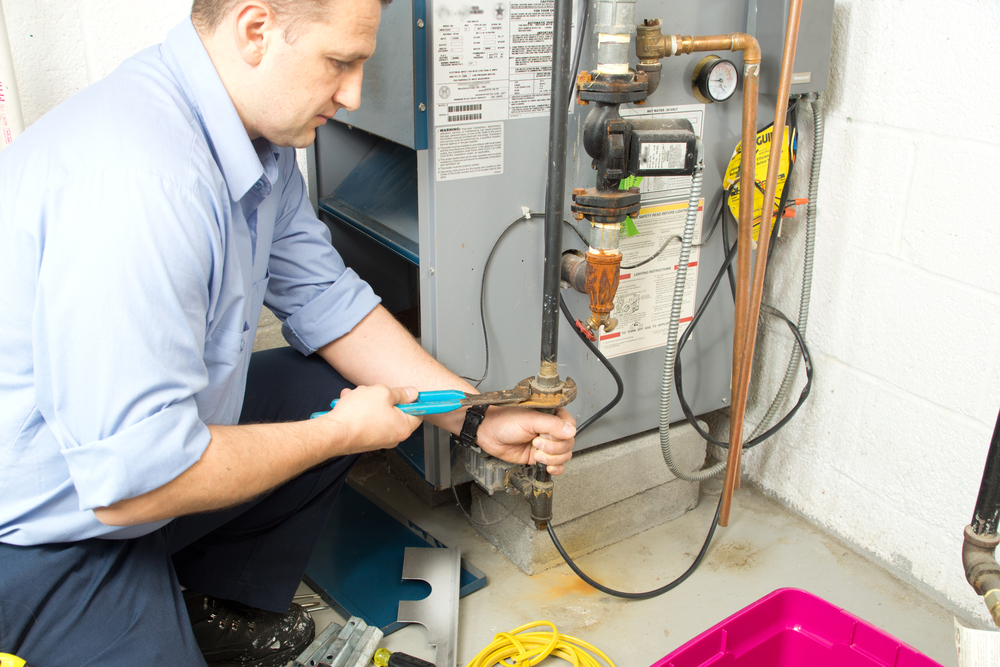Gas Furnace vs Electric Furnace: What’s The Better Option?
Homeowners in Minnesota are no strangers to the frigid temperatures during the winter months. Because of this, the heating needs of Minnesota homeowners are much higher than the typical home. So when your heating system decides to break down, what style of furnace is the better choice moving forward? Gas or electric? Total Comfort is here to help break down the differences between gas furnaces vs electric furnaces so that your decision doesn’t have to be so stressful. And more importantly, to restore heating capabilities so Minnesota homeowners aren’t left out in the cold.

What is the Main Difference Between Electric and Gas Furnaces?
The main difference between these furnaces is the source of fuel they use to generate heat. Electric furnaces use electric coils to warm the air that passes over them. The heated air then circulates through ductwork and into the rooms of the home by vents.
Gas furnaces generate heat by burning natural gas or propane. A controlled flame, or pilot light, inside the furnace, ignites the main gas burners, generating heat. The heat rises to raise the temperature of the air inside the heat exchanger. Like an electric furnace, the heated air is distributed through ducts and then throughout the home.
Gas Furnace Pros
These are the noteworthy gas furnace pros:
- Low energy costs
- Heats home faster than the electric variety
- Runs more efficiently than electric furnaces
Electric Furnace Pros
Here are the pros behind electric furnaces:
- Less expensive to buy and install compared to a gas furnace
- Longer lifespan than gas furnaces
- Electric furnaces have a much quieter operation
Comparing Differences Between Gas and Electric Furnaces
Aside from how these two HVAC components generate heat, there is a slew of differences worth noting. Here are the differences between gas and electric furnaces broken down into categories:
Costs
When it comes to the cost differences between these two furnaces, multiple factors have to be considered. Here are the different types of costs that affect gas and electric furnaces:
Equipment Costs: When breaking down the cost of equipment, gas furnaces will end up costing a step above electric furnaces.
Installation Cost: Electric furnaces cost less to install based on the fact they only need an electrical connection and don’t have ventilation requirements. Gas furnaces will cost more to install, especially if homeowners are switching from electric to gas.
Maintenance Costs : Gas furnaces cost more in terms of upkeep as well due to annual tune-ups. Under certain circumstances, electric furnaces can operate for years without additional maintenance.
Lifespan
In terms of how long these furnaces will last, electric furnaces have a lifespan of more than 20 years. Gas furnaces on the other hand tend to only last between 15 and 20 years. No matter the type of furnace, other factors can hinder or boost their lifespan. Keep reading below to learn more about those other factors.
Climate
When it comes to an electric furnace versus gas, the climate also plays a major role in your choice. For Minnesota homeowners, gas furnaces are typically the better choice. Gas furnaces provide warm air and provide heating for spaces at a much faster rate than electric furnaces. Homeowners in colder climates can get by with an electric furnace, but their heating bills will be much more expensive. Other factors like the amount of sunlight that comes into a home or how windy the area can be can also affect the heating requirements of the home.
Energy Efficiency
In terms of energy efficiency, gas furnaces require less energy to heat the same space than an electric furnace. This gives gas furnaces an advantage in colder climates. The heat produced by gas is much hotter than the heat produced by electrical coils. Electric furnaces do use all of the energy they produce, unlike gas furnaces. This is worth considering when weighing an electric furnace vs gas.
Attention should also be paid to a furnace’s efficiency rating. Annual fuel utilization efficiency from gas furnaces can be as low as 57%, compared to electric furnaces which are often between 95% and 100%.
Installation
As mentioned, electric furnaces are cheaper to install due to the lack of additional work. Gas furnaces require integration with the home’s ventilation requirements, making for a much tougher installation. Total Comfort will gladly help with the transition of systems with new furnace installation.
Maintenance
When it comes to maintenance, gas furnaces require more frequent repairs than electric furnaces. They also require a yearly inspection for gas leaks, corrosion, and carbon monoxide issues as the result of poor ventilation or incomplete burning. The gas furnace’s heat exchanger, gas lines, and ventilation system need to be inspected regularly for degradation.
Heating systems are needed in states like Minnesota on a more regular basis due to the local climate. Because of this, electric furnaces should undergo annual heating maintenance as well.
Electric furnace inspections are more geared towards efficiency, while gas is more focused on safety. And, electric furnaces contain fewer moving parts, so there aren’t a ton of problems to address. Gas furnace repairs can be on the expensive side and replacing a heat exchanger can cost several thousand dollars. The most expensive repair for an electric furnace would be a burnt-out circuit board at a few hundred dollars.
Safety
When gas furnaces aren’t properly maintained or vented, they pose a risk of carbon monoxide exposure. Overexposure to this odorless gas can be fatal, so it’s highly recommended to install a carbon monoxide detector near the furnace and in the living room. If a gas furnace is well-maintained, correctly installed, and vented, they are safe. With strict regulations, industry standards, and placing importance on annual heating inspections, they also pose very little risk of indoor air pollution.
Electric furnaces are safer overall because they don’t produce any noxious byproducts. But like any large electrical device, heat production can lead to short-circuiting and start a fire.

Electric or Gas Furnace: Which is Right For Your Home?
As a final debate of an electric furnace versus a gas furnace, choosing the right option for your home primarily depends on the climate of the region. Considering living in Minnesota comes with a fair share of cold weather, extra considerations should be made before committing to a particular style. Some homeowners may value other factors such as budget, safety, maintenance, installation, and lifespan more than others.
Choose Total Comfort for Your Heating Needs
When it comes to choosing an HVAC company for your heating needs in St. Paul & Minneapolis, MN, choose Total Comfort. Total Comfort has been serving the Minneapolis-St. Paul area since 1956 with renowned service and comprehensive heating services. Contact Total Comfort today for the warmth your home deserves.












